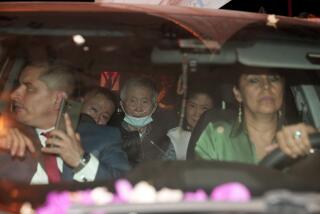Cameras rolling and security tight, Fujimori lands in Peru
- Share via
LIMA, PERU — Former Peruvian President Alberto Fujimori, ordered extradited back to his homeland from neighboring Chile on corruption and human rights charges, touched down on Peruvian soil Saturday for the first time since his decade-long rule ended in disgrace and exile in 2000.
The ex-president’s arrival in the capital amid extraordinary security was carried live on news television stations and culminated more than 24 hours of uncertainty about when he would arrive.
Curious Peruvians were keen to catch a glimpse of the divisive figure, reviled by many as a corrupt despot and hailed by others as a hero.
A police aircraft carrying Fujimori from Chile landed on a military base here at 4:38 p.m., almost eight hours after the lumbering Antonov 227 propeller plane left Chile, having stopped twice to refuel.
At one point, local media reported, a doctor attended to the 69-year-old Fujimori because of a drop in his blood pressure.
Once the plane landed, Fujimori was hustled into a waiting helicopter and concealed from the view of cameras. The helicopter took him to the police base where he is being held pending his trial.
Viewers only caught a brief glimpse of the ex-leader as he descended from the helicopter and stepped into an unmarked four-wheel-drive vehicle. The television images indicated he was not handcuffed but flanked by security men.
Snipers were posted atop surrounding buildings, and riot police with shields formed a cordon at the entrance to the base.
The extreme caution surrounding the event underscores the challenge faced by the government of President Alan Garcia, who feels pressure from two sides: pro-Fujimori factions who want their idol freed, and critics of the former president who say he should spend the rest of his life behind bars.
Interior Minister Luis Alva Castro called for calm, and the capital weathered Fujimori’s return without a major incident.
Before Fujimori’s plane touched down, jubilant supporters had gathered near the air base where he was expected to arrive.
They welcomed him more as a returning champion than as a fallen chief of state who could spend the rest of his life in jail.
“Finally, El Chino, the man Peru needs, is coming back,” said Betsy Puelles Gomez, 47, using the common nickname for Fujimori, though he is of Japanese, not Chinese, extraction.
“He was the only one who helped the poor. He defeated terrorism. It’s not logical that he would be accused of killing anyone when he defeated the terrorists.”
Added Aurora Quevedo Solis, 50: “Fujimori is innocent. He defeated the terrorists and brought us peace.”
In the 1990s, Fujimori’s government defeated a violent leftist insurgency, headed by the Shining Path guerrilla group, that turned much of the country into a war zone. Bombs were going off in Lima and universities were transformed into guerrilla indoctrination grounds, prisons into insurgent strongholds.
But human rights activists say the fight against the guerrillas had a sinister side: Fujimori allegedly unleashed death squads who killed 25 people in two separate massacres.
Among the charges facing Fujimori here is his alleged responsibility for the government-backed raids that resulted in the 25 deaths.
“Now it’s time for Peruvian justice to do the right thing,” said Gisela Ortiz, whose brother Enrique was among 10 killed in a 1992 government operation known as the massacre of La Cantuta.
Human rights activists have hailed Fujimori’s extradition as sending a message worldwide that despotic and corrupt leaders no longer enjoyed immunity for their actions.
The case is a singular instance of a former head of state being extradited back to face justice in the country he once led.
“This is a major blow against impunity,” said Jose Miguel Vivanco, Americas director for Human Rights Watch.
Fujimori has always contended that the dire threat facing the nation when he took office in 1990 required extreme steps, including, at one point, disbanding Congress and suspending the constitution.
“In the year 1990, Peru didn’t have any light at the end of the tunnel,” Fujimori told a Peruvian radio station Friday before leaving Chile, referring to the year he took office.
He vowed a vigorous defense of his actions in a trial that seems certain to revive the turbulent years of his presidency. Fujimori supporters say the charges against him are politically motivated.
“I will demonstrate that I acted correctly,” Fujimori vowed before leaving Chile.
The prospect of his administration being dissected in a court has raised fears of further fissures in a country that is already replete with social divisions.
In the emotionally charged atmosphere of Fujimori’s return, Lima Archbishop Juan Luis Cipriani called on Peruvians to put aside past hatred and the desire for revenge.
“The country requires a greater maturity,” Cardinal Cipriani said on a radio program.
Fujimori left Peru in 2000 in the midst of a corruption scandal and accusations that massive fraud had helped him win a third term.
He lived five years in Japan, his parents’ homeland, before being arrested in Chile in 2005 in a thwarted political comeback. Chile’s highest court ordered him extradited to Peru on Friday on a petition from the Peruvian government.
--
patrick.mcdonnell @latimes.com
Special correspondent Adriana León in Lima contributed to this report.
More to Read
Sign up for Essential California
The most important California stories and recommendations in your inbox every morning.
You may occasionally receive promotional content from the Los Angeles Times.












